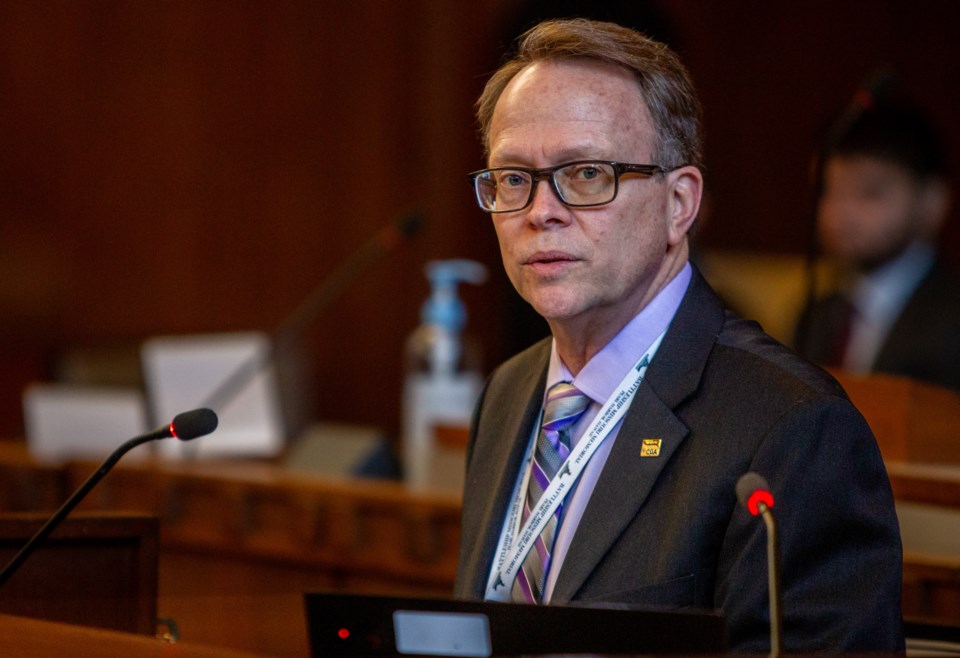Vancouver’s independent auditor general is estimating the work his staff has already done to highlight deficiencies in city departments will mean “a total economic benefit” to the City of Â鶹´«Ã½Ó³»of $78 million by 2029.
The $78-million benefit will either be through cost savings, cost avoidance or enhanced revenue, according to a new report that Mike Macdonell and his team presented to council Feb. 13.
“Obviously, I'm quite pleased with this result,” he said. “I must caution though that my goal is for the office to cover its costs, to break even, rather than be a profit centre. This is an appropriate goal for an audit office. Not all audits will have financial implications, and nor should they.”
Macdonell’s long-term goal when he accepted the role as auditor general in 2021 was to at least match savings to the cost to set up and operate his office.
That goal is well on its way to being realized.
Macdonell told council that the city’s current rate of implementation of his office’s audit recommendations should result in $16.9 million in savings to date.
The total cost to operate his office since inception was $5.2 million for a return on investment of 328 per cent. Removing start-up costs of $551,000 for the office, the return increases to 367 per cent.
Permits
A chart included in the auditor general’s annual report shows the bulk of the $78 million in benefits is coming — and will continue to come — from how the city collects money for permits.
The city’s improved permit cost recovery model is estimated to save or return a total of $50.8 million between 2023 and 2027.
The auditor general’s office conducted a performance audit between January 2021 and June 2022 on the accuracy of building permit fees, and associated administrative processes and practices.
Deficiencies and discrepancies were found in how some permits were processed and fees determined.
The audit found city staff did not provide detailed guidance to applicants to ensure that project cost estimates submitted in building permit applications were “complete, reasonable and supportable.”
The audit also found the city lacked written procedures and guidance for staff on the building permit fee assessment process, with discrepancies identified in valuation methods used to determine the cost of a project.
'Inherent limitations'
For example, the Marshall & Swift valuation method — a nationally recognized cost-estimation program used to determine the market value of a building — was not used by the city’s development, building and licensing department to validate cost estimates provided by applicants.
The Marshall & Swift method is specified in the city’s building bylaw.
“The use of cost estimates provided by applicants as the foundation for calculating fees has inherent limitations,” the audit report said.
“Estimates can vary widely depending on the estimation method and assumptions used and may not be fully reflective of actual project costs due to the uncertain nature of the estimation process.”
Macdonell’s team reviewed one application that valued the proposed work at $30 million and found that the same project was valued at approximately $23 million using the Marshall & Swift method.
Using another industry comparator, the auditors determined the value at $48 million.
In one case, the auditors found the city could have collected an additional $27,394 in fees. In another case, the city should have collected $1,674 less in fees.
Macdonell’s report contained five recommendations to improve the administration of building permit fees, including “redesigning processes to more explicitly comply with the building bylaw and address risks of under-charging and over-charging fees.”
The city’s development, building and licensing department accepted the recommendations, with Macdonell noting in a progress report in December 2024 that six of the eight recommendations were to be implemented by year’s end.
'Challenges and risks'
Macdonell emphasized in an interview that savings can only be achieved if departments choose to accept and implement his office’s recommendations. He also shared with council that he believes he is the only auditor general in Canada who voluntarily publishes estimated cost savings, or benefits.
“I believe this is due in large part to the challenges and risks associated with auditors presenting this kind of information,” he said.
“Primarily among these challenges is the issue of attribution. It's the city that ultimately implements my audit recommendations, and it's difficult to directly attribute to my work costs that have been saved or avoided, or revenues that have been enhanced.”
Macdonell said he takes “a very conservative approach” in calculating the amounts and updates them periodically in consultation with city staff. But, he added, they remain nonetheless estimates that can't be independently verified.
His office has also conducted audits of the city’s child care, cultural and social non-profit leases, building permit fees, park board revenue management, office furniture purchases, and did a risk management audit of the Â鶹´«Ã½Ó³»Police Department.
An audit on cyber security was presented in camera because of the sensitivity of the topic.
X/@Howellings




